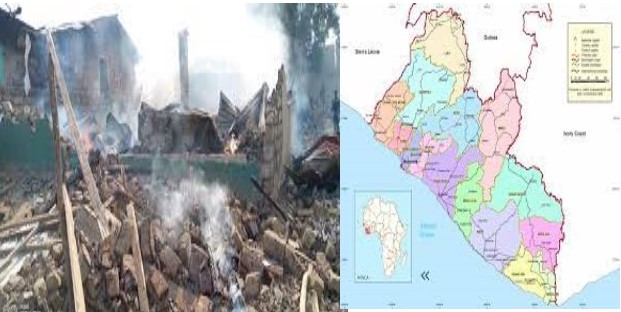FLASHBACK; Warehouse burnt by angry mob amid recent land dispute in Ganta
By Alfred Kollie, alfredkolliejr92@gmail.com
The Institute for Research and Democratic Development (IREDD) has said it is troubled by the recent crisis in Nimba County specifically concerning land dispute in Ganta which left properties damaged and disrupted the peace and movement of the inhabitants in that county.
The Nimba land crisis is one of intractable conflicts which continues to manifest through land disputes but seems to have its foundation in ethnic acrimonies and associated unaddressed years of grievances exacerbated by years of civil war.
During the years of war in Liberia, Nimba County served as a major theatre of combat thus triggering the polarization of tension between and amongst inter-groups which led to the destruction not only of physical infrastructure – but of lives.
It has also destroyed the entire social fabric of the society with the effects of the period is still a source of tension, and stand in the way of reconciliation between former rivals, IRED observed.
Last month land crisis in Ganta Nimba County came a day after the 8th Judicial Circuit Court in the county ruled in favor of a resident of Ganta, Fred Suah, against four different family members believed to be from the Mandingo ethnic group in a land dispute case that had delayed for over 12 years.
Court officers after the ruling were accompanied by officers of the Executive Protection Service (EPS) to effect the demolition of 10 houses owned by four different families on the two blocks of the disputed land situated on the Saclepea road in Nimba County.
Speaking Wednesday May 12, 2021 in Monrovia, IREDD Executive Director Matthias M. Yeanay called on the Liberian government to ensure and resolve rising land and other potentially conflict related issues without delay, as justice delay is equivalent to justice denied.

According to Mr. Yeanay, IREDD has been working with broad range of inter-groups including members from all ethnic groups, local and traditional authorities, religious leaders and youth and women’s groups with support from the African Transitional Justice Legacy Fund to further understand the conflict dynamics and to develop a long term mitigation strategy to build an atmosphere for coexistence, inclusivity and trust among adversarial groups.
‘’Our intervention specifically seeks to mitigate or ease the rising land, tribal and religious tensions in Ganta City which culminated into the dedication of a peace monument. At the same time, participants at our just ended peace conference also registered troubling testimonies involving some media houses in Nimba in relations to their reportage and the inflammatory messages they ran on their platforms’’ He explained.
The IREDD Executive Director noted that the Institute was shocked by these vivid accounts and calls on the government and the Press Union to investigate and ensure media organizations found culpable are sanctioned.
‘’Let the word go forth that every trigger ranging from unemployment, economic hardship, fail social services, poor governance system, harsh tax regime, corruption and the lack of accountability – all of which serves as drivers for public discontent are rip and could run into an outburst if the peace is not cautiously managed,’’ Mr. Yeanay said.
The IREDD boss explained that accounts from participants also established poorly regulated and dis-organizational land survey practices, lack of proper documentation for cross referencing in land sale transactions and the absence of registered assigned surveyors are key factors responsible for land disputes.
“Contrary to the thinking that the crisis in Nimba is exclusively rooted in tension between Mandingo on one hand, and the Mano and Gio on the other over private properties ownership in urban settings as has been widely reported, the conflict can be found across varies causes. Although mostly about land, there are other notable sources such as inter-ethnic disputes, exclusionary governance practices as well as apprehension over the relationship between modernization and traditional practices,’’ the IREDD Director concluded.

